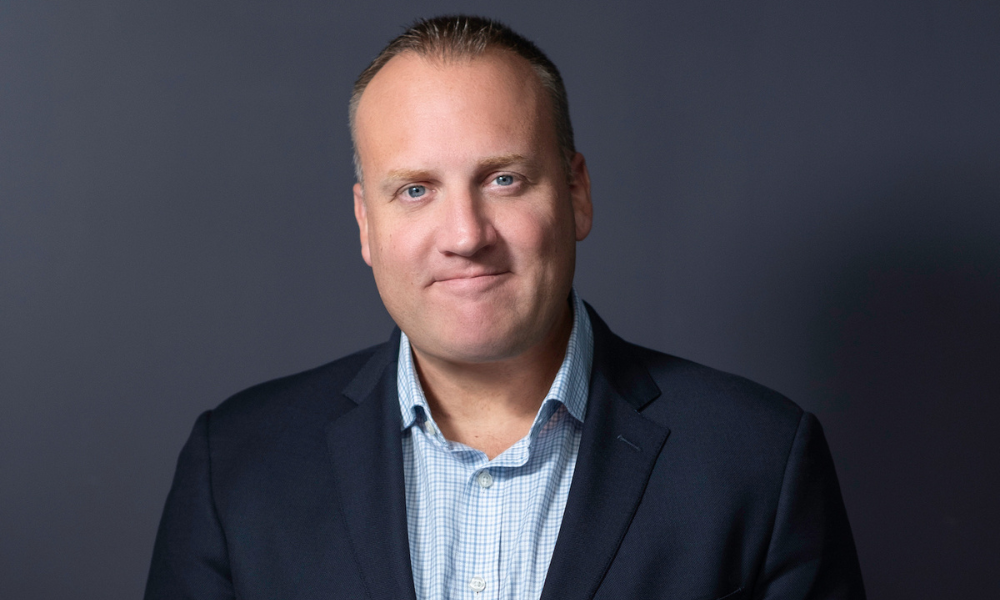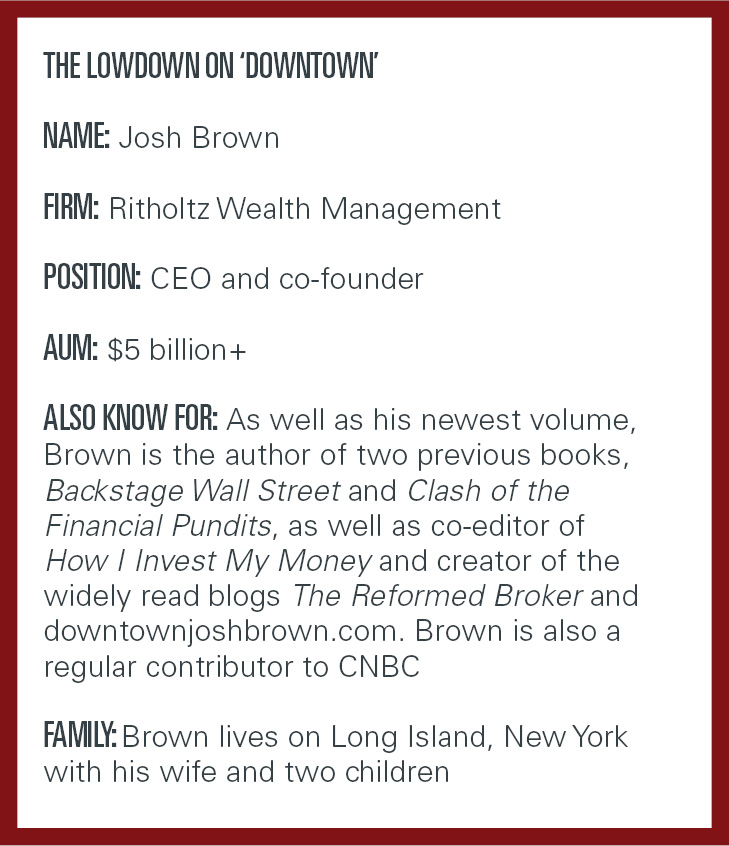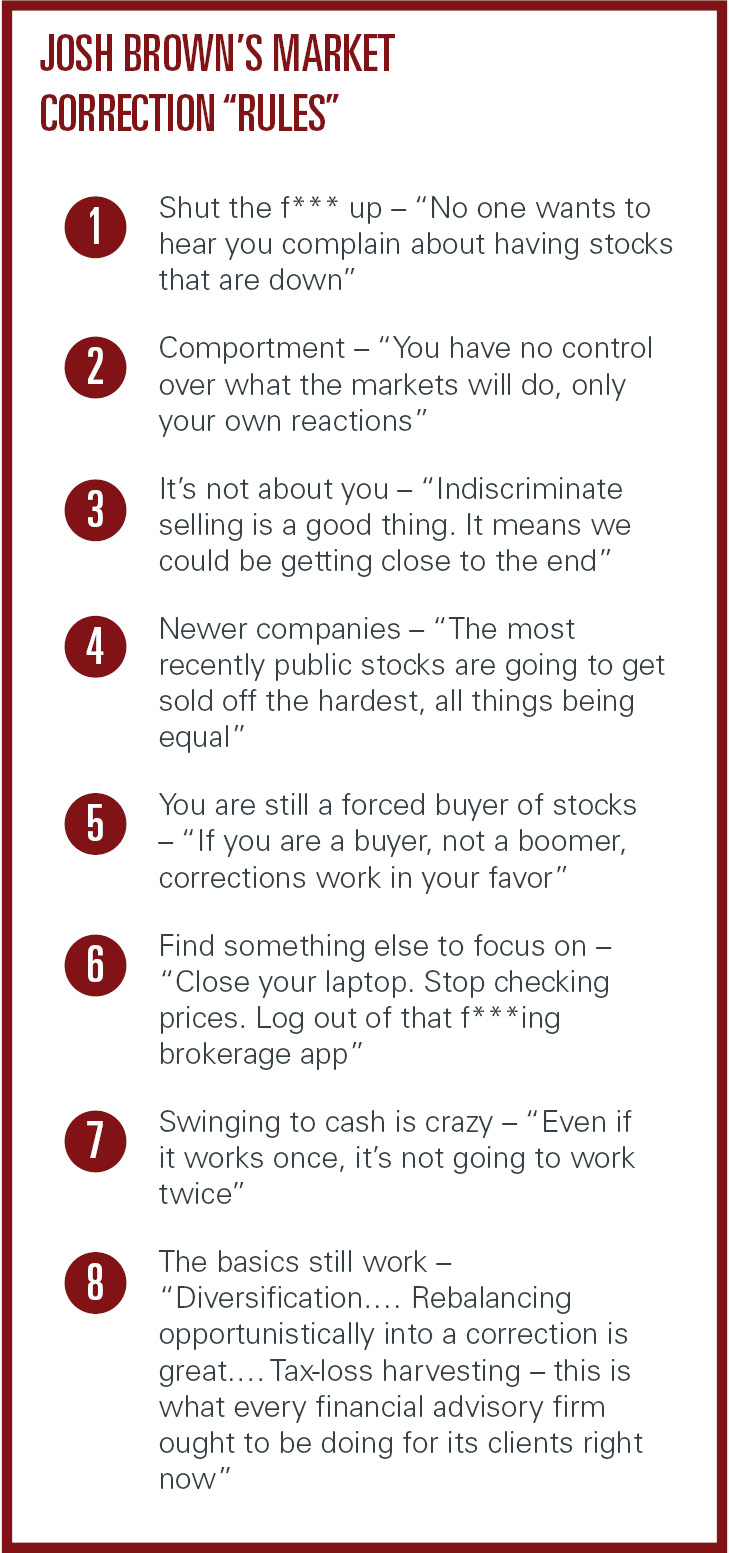

RIA success is apparently not stopping the “Butcher of Park Avenue” from showing how the Wall Street sausage gets made.
Joshua Brown may be best known as “Downtown Josh Brown,” his moniker on CNBC’s Halftime Report, where he appears regularly to opine on streaking stocks. Then again, some market watchers may still refer to him as the “Reformed Broker,” the title of the financial blog that not only transformed Brown into a social media superstar but saved him from a lupine life in one of Long Island’s notorious boiler-rooms.

But in his new book, You Weren’t Supposed to See That, Brown proudly proclaims himself the “Butcher of Park Avenue,” and not because as CEO of $5 billion AUM Ritholtz Wealth Management he likes to carve up clients with outsized commissions. Not by a long shot.
 The reference goes back to a blog post he wrote years ago about how looks can be deceiving, no matter whether one is soliciting medical or financial advice. Put simply, in Brown’s view, merely because a professional dresses snappily and can point to an Ivy League diploma on the wall, it doesn’t mean that person is the best for a particular job. In fact, given the choice between a smooth-talking, Harvard-educated surgeon straight from central casting and an unkempt, “butcher”-looking schlump with a heavy New Yawk accent, Brown’s recommendation is to go with the latter.
The reference goes back to a blog post he wrote years ago about how looks can be deceiving, no matter whether one is soliciting medical or financial advice. Put simply, in Brown’s view, merely because a professional dresses snappily and can point to an Ivy League diploma on the wall, it doesn’t mean that person is the best for a particular job. In fact, given the choice between a smooth-talking, Harvard-educated surgeon straight from central casting and an unkempt, “butcher”-looking schlump with a heavy New Yawk accent, Brown’s recommendation is to go with the latter.
Why? Because the butcher had to overcome more in terms of perception, and, as a result, is likely the more skilled operator, despite the lack of fanfare and accoutrements.
Yeah, Downtown Josh Brown can sometimes get pretty deep like that. And that depth continues to elevate his literary and industry standings. And quite literally, too, as fast-growing Ritholtz Wealth Management recently moved on up from a moderate-sized Park Avenue sublease to a full-floor, deluxe office in the sky above New York’s Bryant Park.
Career and personal growth aside, Brown is intent on demonstrating with his latest book that he is not finished speaking truth to power or money, or both – and, even more pressingly, showing that while you can add CEO to his title, you still can’t take the “butcher” out of the boy.
Brown’s biography is fairly well known to anybody who has read his previous releases, Backstage Wall Street and Clash of the Financial Pundits, or heard him speak during one of his many TV or internet appearances (during which he also proves you can’t strip the South Shore “Strong Island” accent from the boy either).
Very briefly put, the great financial crisis of 2008 sparked an early career course correction in which Brown switched from old-school stockbroker to fiduciary-slash-financial advisor. Helping usher him along the road to his own professional Damascus was a revelation that he could employ his blog-writing skills and critical eye to build his brand. That and a rude reminder from his wife that honesty is more than just a pretty good policy – it’s good business, too.
“She's much smarter than I am, she went to Michigan, so she said, ‘Hey idiot, don't you see the problem here? If you have to do the wrong thing for your clients [in order] to get paid, you’re in the wrong business,’” said Brown. “It became really obvious to me that the compensation structure was inherently conflicted, and I was just not helping anyone. And so that was the epiphany. And once I decided to move away from transactional brokerage over to the investment advice side and be an ally of the client rather than a counterparty, that’s when my life changed.”
Brown’s internet screeds on The Reformed Broker shone spotlights on several shady products and services that Wall Street historically trafficked in without consumer or governmental consequence. The blog snowballed in popularity, bouncing from trading desk to trading desk, eventually drawing the attention of Barry Ritholtz, a fellow financial blogger with an already established and rapt audience.
Brown still calls Ritholtz an inspiration in his journey to wealth-management respectability. In retrospect, though, the pair’s convergence sounds more like kismet than a Wall Street version of meet cute.
“We had very complementary advantages and disadvantages,” said Brown. “Barry had the whole world wanting to give him money. But he's not a financial advisor. And I had no one in the world wanting to give me money, but I am a financial advisor. So we put our situations together, and we latched on to each other, and we figured it out.”
One theme Brown consistently hammers home in all his books and CNBC hits is that simplicity trumps complexity. And Brown’s firm belief that less is more over the long run is the cornerstone of Ritholtz’s wealth-management strategy, specifically when it comes to portfolio construction and fees.
“Basically what we're doing is delivering index-like simplicity,” said Brown. “But we’re using the individual components of the indices, the individual stocks, in order to do daily tax-loss harvesting and to reduce areas of concentration where it makes sense for each client’s financial plan.”
And while he often plays a stock-picker on TV, Brown has no problem prescribing ETFs or indices for clients should the case merit it.
“We're far more likely to be using factors and tilts then we are to be using active portfolio management,” said Brown. “And the main thing is to keep costs low and keep turnover to the minimum. And I think when you do that over time, you do a great service to your clients.”
Keeping fees low, of course, has never been a Wall Street priority. And the industry’s move toward low-cost ETFs and model portfolios has forced the powers that churn to look for new sources of revenue. One of those sources is private credit, an area of growing concern for Brown, who sees it as nebulous, costly, complex, unnecessary … you know, the usual Josh Brown suspects.
“This is the new active management,” said Brown. “Nobody will ever again pay one percent for somebody to pick stocks for them. That world is gone, and it’s never going to come back. So Wall Street’s not stupid. Wall Street’s like, ‘What can we get them to pay one percent for?’ They figured it out. It's private equity.”
Brown characterizes the race to create and sell private equity products as a way for financial advisors to “differentiate themselves from Vanguard.”
“A lot of unsuspecting retail investors are being plunged into this world of two and twenty, and one and ten, and lockups, and performance reporting that’s not written in English, and mark-to-market accounting. And nobody has any idea what the hell is going on,” said Brown, adding, “This is probably going to end up being something I'll be forced to write a book about in three years when most of it doesn't work.”
Yet while Brown certainly does not come to praise the wirehouses that once ruled Wall Street, he has no plans to bury them, either. Even as the RIA market increasingly swells with refugees from Wall Street investment banks, Brown says the two worlds will continue to coexist peacefully. More or less.
 “There is a category of high-net-worth investor who likes the white-glove services that the investment banks provide. There are many Fortune 500 executives who have companies that are involved with these investment banks, and they are doing IPOs and secondaries, and they are consulting on strategic transactions,” said Brown. “They have these interactions with the bank and then they say, ‘Hey, Morgan Stanley, is there somebody I could talk to at the bank about my personal account?’”
“There is a category of high-net-worth investor who likes the white-glove services that the investment banks provide. There are many Fortune 500 executives who have companies that are involved with these investment banks, and they are doing IPOs and secondaries, and they are consulting on strategic transactions,” said Brown. “They have these interactions with the bank and then they say, ‘Hey, Morgan Stanley, is there somebody I could talk to at the bank about my personal account?’”
That said, even if Brown is not predicting the ultimate demise of the investment banks and their private-client divisions, he does not hesitate to point out that the large wirehouses have spent the last decade trying to look and act more like RIAs than vice versa.
“I think the RIAs won, and that’s why you’re seeing us being imitated, even amongst giant Wall Street investment firms,” said Brown.
He’s not the only one who has noticed, of course. Wall Street’s private equity giants have not only been clocking the growth of America’s RIA businesses, but they have been bidding up and rolling up wealth managers as fast as they can.
Brown brushes off that game, too.
“I don’t understand why an advisor would work at a firm that gets resold every five years. To me, it's mystifying. So we’re not in that world. We’re not aggregating. We’re not letting people have their own DBAs and utilize our back office. We’re not letting people use our name and then do whatever they want,” said Brown.
The Butcher of Park Avenue continued, “The advisors who choose to work with us have made that decision and not because we’ve written them a check – we also don’t do that. They’ve made that decision because they believe in what we’re doing and they want to be a part of it.”

Former Northwestern Mutual advisors join firm for independence.

Executives from LPL Financial, Cresset Partners hired for key roles.

Geopolitical tension has been managed well by the markets.

December cut is still a possiblity.

Canada, China among nations to react to president-elect's comments.
Streamline your outreach with Aidentified's AI-driven solutions
This season’s market volatility: Positioning for rate relief, income growth and the AI rebound
